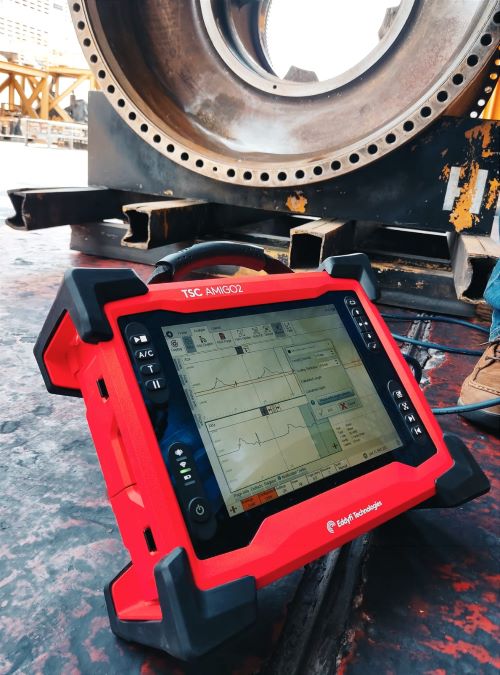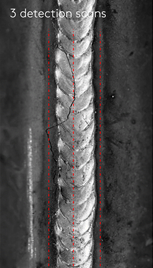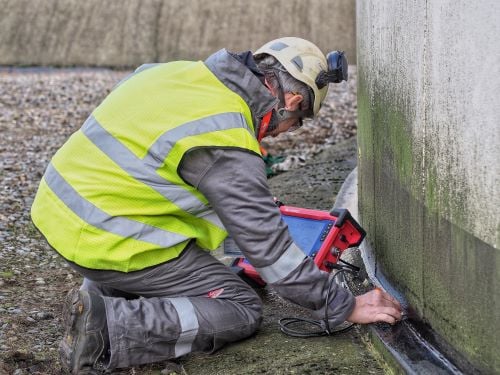The SE instrument, making advanced NDT more accessible, is a single element version of the proven Amigo2 ACFM instrument – and it’s available now. But first, let us take a look at how a single element ACFM instrument is a worthy upgrade from conventional inspection methods. Compared to conventional inspection techniques, ACFM has proven its worth in several markets and applications, but this is not what this article is about: it’s all about how a single element NDT system can be considered an advanced high-performance NDT solution.

We’ve always been firm believers in performance, and it shows with our products’ visible technological advancements and performance. Eddyfi Technologies’ topside ACFM instrument, the Amigo2, is an excellent example. Thanks to advanced electronics, a SENSU 2 range of single element and array probes, and a high-quality and efficient software package, Amigo2 is a breeze to deploy in the field. Of course, our SENSU 2 array probes offer a fantastic opportunity to optimize a whole inspection project further but the SENSU 2 single element ACFM probes are also noteworthy when used with the Amigo2. Forget what you think you know about single element NDT probes; SENSU 2 single element ACFM probes feature:
- Wide coverage,
- fast scanning,
- Assist (the software powering the instrument) enabled highly efficient inspection workflow, and
- a wide range of applications for maximum ROI.
1. Wide Coverage
With the ability to cover 15 millimeters (0.6 inches) with the standard SENSU 2 single element ACFM probes (Figure 1), you can be assured you’ve got it covered. Axial or transverse cracks will be detected within seven millimeters (0.3 inches) of the probe center, which means that for most welds, detection scans (which account for around 95% of the overall inspection time) can be completed in only three scans: one on the weld cap, and one scan per weld toe (Figure 2).
Figure 1 15 millimeter (0.6 inch) wide coverage enables detection with a minimal amount of detection scans.

Figure 2 Most welds can be covered for flaw detection in three scans using a single element ACFM probe
2. Fast Scans
With the introduction of the SENSU 2 ACFM probe technology along with the Amigo2 a few years back, much higher scanning speeds were made possible while still producing high quality data and Signal-to-Noise Ratio (SNR). Get ready to be amazed if you were used to the older generations of ACFM or other systems. Check out this one-man gear inspection video that demonstrates the technology’s efficiency.
Video State-of-the-art electronics enable fast scanning while retaining high-quality data and signal-to-noise ratio.
3. Optimized Assist Enabled Workflow
Deploying single element ACFM inspections has its challenges. Relying on line scans alone makes relating data to the inspected part’s geometry more challenging. More scans are required, and as such, making the results auditable requires particular diligence in the software design and workflow. Challenge accepted: Single element ACFM inspections with the Amigo2 SE are easy thanks to onboard Assist software key features like:
- Plug-and-play operations: Ready to scan out of the box with configuration files pre-loaded on the probe, and no onsite calibration required.
- Auditable data: Assist is optimized for weld inspection. What you do and where you do it is all recorded in the inspection files and reports in a clear and logical data naming pattern, with data overlayed with visual markers.
- Versatile control: Assist can be controlled via the probe buttons, the instrument hard keys, or the touchscreen. No matter what you’re doing or in what conditions, there’s always an efficient way to be in control of your inspection.
Inspection planning is another essential feature of Assist, which is also relatively new. Single element probes are often used on complex welded components and geometries. Assist software can create inspection plans for such structures which can be loaded and used to execute the inspection faster while minimizing the risk of missing welds.
To get a better understanding of how this works, have a look at this video where we explain and demonstrate the inspection of a complex welded component using inspection planning.

4. Wide Application Range
The Amigo2 SE supports the same application range as the standard Amigo2 minus the array probe option. It’s a versatile tool that can improve the inspections of several different applications, for example:
-
Gear inspection (as demonstrated in above video)
-
Railcar components including tank cars, as explained here and here
When it comes to advanced NDT inspection solutions, selecting the right tool for the job comes down to not only what gets the job done but also what fits within the budget. As we’ve shown above, the Amigo2 SE is a cost-effective, powerful, advanced NDT solution that can address a wide range of applications with results you can trust. We invite you to contact our team of experts who would be happy to discuss your upcoming projects and help you stay Beyond Current.






%20wide%20coverage%20enables%20detection%20with%20a%20minimal%20amount%20of%20detection%20scans.png?width=370&name=15%20millimeter%20(0.6%20inches)%20wide%20coverage%20enables%20detection%20with%20a%20minimal%20amount%20of%20detection%20scans.png)